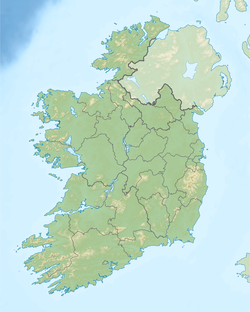
Back Drogheda Afrikaans دروهيدا ARZ Дроэда Byelorussian Дрогеда BE-X-OLD Дроида Bulgarian Drogheda Catalan Drogheda CEB Drogheda Czech Drogheda Welsh Drogheda Danish
Drogheda
Droichead Átha | |
|---|---|
 Clockwise from top: Drogheda viewed from the south; Millmount Fort; West Street, Drogheda | |
| Motto(s): "God Our Strength, Merchandise Our Glory." | |
| Coordinates: 53°42′54″N 6°21′09″W / 53.7150°N 6.3525°W | |
| Country | Ireland |
| Province | Leinster |
| County | County Louth and County Meath |
| Municipal district | Drogheda Borough District |
| Founded | 911 AD |
| First Charter | 1194 |
| County Status | 1412[1] (Abolished 1898) |
| Government | |
| • Dáil constituency | Louth |
| • EU Parliament | Midlands–North-West |
| Area | |
• Total | 14.8 km2 (5.7 sq mi) |
| Highest elevation | 27 m (89 ft) |
| Lowest elevation | 1 m (3 ft) |
| Population | |
• Total | 44,135 |
| • Rank | 6th |
| • Density | 2,776.6/km2 (7,191/sq mi) |
| • Greater area | 83,000[3] |
| Demonyms | Droghedean, Boynesider |
| Time zone | UTC±0 (WET) |
| • Summer (DST) | UTC+1 (IST) |
| Eircode routing key | A92 |
| Telephone area code | +353(0)41 |
| Website | www |

Drogheda (/ˈdrɒhədə, ˈdrɔːdə/ DRO-həd-ə, DRAW-də; Irish: Droichead Átha [ˈd̪ˠɾˠɛhəd̪ˠ ˈaːhə], meaning "bridge at the ford") is an industrial and port town in County Louth on the east coast of Ireland, 43 km (27 mi) north of Dublin city centre. It is located on the Dublin–Belfast corridor on the east coast of Ireland, mostly in County Louth but with the south fringes of the town in County Meath, 40 km (25 mi) north of Dublin city centre. Drogheda had a population of 44,135 inhabitants in 2022, making it the eleventh largest settlement by population in all of Ireland, and the largest town in Ireland,[a] by both population and area.[4] It is the second largest in County Louth with 35,990 and sixth largest in County Meath with 8,145. It is the last bridging point on the River Boyne before it enters the Irish Sea. The UNESCO World Heritage Site of Newgrange is located 8 km (5.0 mi) west of the town.

Drogheda was founded as two separately administered towns in two different territories: Drogheda-in-Meath (i.e. the Lordship and Liberty of Meath, from which a charter was granted in 1194) and Drogheda-in-Oriel (or 'Uriel', as County Louth was then known). The division came from the twelfth-century boundary between two Irish kingdoms, colonised by different Norman interests, just as the River Boyne continues to divide the town between the dioceses of Armagh and Meath. In 1412, these two towns were united, and Drogheda became a county corporate, styled as "the County of the Town of Drogheda". Drogheda continued as a county borough until the establishment of county councils under the Local Government (Ireland) Act 1898, which saw all of Drogheda, including a large area south of the Boyne, become part of an extended County Louth. With the passing of the County of Louth and Borough of Drogheda (Boundaries) Provisional Order 1976, County Louth again grew larger at the expense of County Meath. The boundary was further altered in 1994 by the Local Government (Boundaries) (Town Elections) Regulations 1994. The 2007–2013 Meath County Development Plan recognises the Meath environs of Drogheda as a primary growth centre on a par with Navan.
The town was selected to host Fleadh Cheoil na hÉireann for two years in 2018 and 2019.[5]
- ^ Johnston, L. C. (1826). History of Drogheda: from the earliest period to the present time. Drogheda. p. 37. Archived from the original on 9 May 2016. Retrieved 16 October 2015.
- ^ "Population Density and Area Size 2016 by Towns". Central Statistics Office (Ireland). Archived from the original on 24 March 2019. Retrieved 13 December 2017.
- ^ "Cromwell back at gates of Drogheda – demanding a city". Independent.ie. 2 December 2017. Archived from the original on 2 December 2017. Retrieved 2 December 2017.
- ^ a b "F1015: Population and Average Age by Sex and List of Towns (number and percentages), 2022". Census 2022. Central Statistics Office. April 2022. Retrieved 29 June 2023.
- ^ "Drogheda to host Fleadh Cheoil". Irish Independent. 18 March 2017. Archived from the original on 17 May 2017. Retrieved 11 July 2017.
Cite error: There are <ref group=lower-alpha> tags or {{efn}} templates on this page, but the references will not show without a {{reflist|group=lower-alpha}} template or {{notelist}} template (see the help page).



